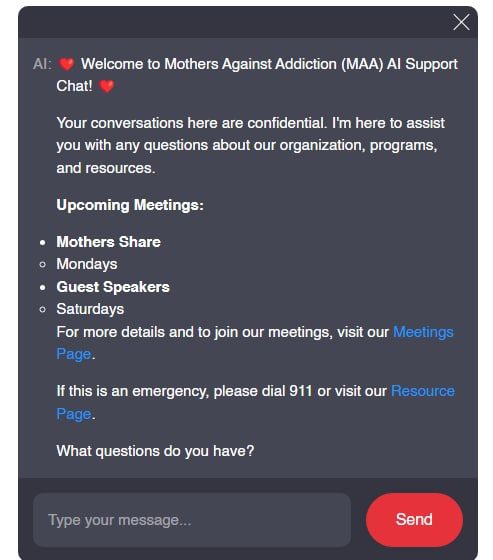When we think about the impact leaders have on their communities, it’s easy to overlook the emotional resonance they create. Visionary leaders—those who dare to challenge the norm and inspire change—give us insight into how leadership shapes not just industries, but lives. At Mothers Against Addiction, we recognize that many parents struggle with the heartbreak of seeing their children drift toward addiction or deal with the pain of loss. The characteristics that define visionary leaders can deeply resonate with parents facing these immense challenges. So let’s embark on a journey, consuming insights into what sets these leaders apart and how these lessons can apply in the lives of families touched by addiction.

Consuming Thoughts: What Sets Visionary Leaders Apart?
Visionary leaders bring about profound changes, creating paths that others may not see. Their ability to embrace change, innovate, and uplift those around them is paramount. Let’s explore the defining traits that separate them from conventional leaders.
1. Embracing Change and Innovation
Visionary leaders are unafraid to take risks that often defy expectations. Take Elon Musk‘s ventures, for instance. With Tesla and SpaceX, he not only envisioned the future of electric vehicles but also opened up possibilities for space exploration. By embracing technological advancements, Musk has redefined how we think about sustainable energy and interplanetary travel—ideas that may have seemed outlandish just a decade ago.
What can parents learn from this? Embracing change in our lives, whether it’s seeking support groups or understanding new treatment options, can redefine our families’ narratives. Innovation, like viewing addiction treatment holistically, can create pathways for recovery that may not have been considered before.
2. Building Protective Teams and Cultures
Empathy and collaboration are at the heart of Satya Nadella’s approach at Microsoft. Since becoming CEO, he fostered a healthy work culture built around trust and teamwork. This environment encourages individuals to speak up, share their ideas, and feel safe doing so.
For parents, this lesson is crucial. Building a protective environment around their children—whether by fostering open communication or connecting with supportive communities—can lay the groundwork for recovery. The courage to create a nurturing space promotes healing, and it is a trait every parent can embody.
3. Myth-Busting Traditional Leadership Models
Malala Yousafzai exhibits how leadership knows no bounds of age or experience. Standing up for education and women’s rights at tender age highlighted that the message is often more powerful than the messenger. She shattered stereotypes, showing that passion, determination, and advocacy can transform lives.
Parents can find inspiration here, too. Challenging the myths surrounding addiction—like the erroneous belief that it’s a weakness or a character flaw—can help their children embrace their journeys. This shift in perspective fosters understanding and compassion, essential ingredients for any form of healing.
4. Lethal Focus on Sustainable Practices
Yvon Chouinard, founder of Patagonia, takes sustainability to heart. By implementing eco-friendly practices across his company, he showcases a lethal focus on corporate responsibility. The consumer demand for sustainability reflects a changed world where many value ethical business.
Families can adopt a similar approach by emphasizing sustainable wellness practices in their lives. Finding balance through mindfulness, healthy habits, and supportive networks can transform daily routines and nurture the overall well-being of families dealing with addiction.
5. Creating Communities: The Role of Networking
Brené Brown has not only built a following through her work on vulnerability but has also created a community that thrives on shared values. The connections formed through her insights encourage collective growth.
In the landscape of addiction, belonging to a supportive community is vital. Groups like Mothers Against Addiction provide that much-needed safe space where parents can connect, share, and learn from one another, reinforcing the healing journey never has to be done alone.
6. The Impact of Technology and Social Media
Gary Vaynerchuk excels in leveraging technology to engage his audience. His savvy use of social media amplifies connections and disseminates vital information, proving how platforms can effectively share powerful messages.
Parents can utilize technology to their advantage, connecting with resources and communities online. Whether it’s following Mothers Against Addiction for tips and inspiration or accessing forums where others share their experiences, technology can be a lifeline.
7. Crafting a Unique Personal Brand: Miriam’s Influence
Miriam-Webster epitomizes dynamic leadership through its playful engagement on platforms like Twitter. By maintaining relevance with cultural trends, they’ve transformed their brand into a lively contributor to public conversations.
As parents look to navigate the delicate weave of their children’s lives through addiction, they can consider crafting their personal “brand”—a narrative that speaks to resilience and support. By sharing experiences and lessons learned, they contribute to an evolving conversation about addiction.

You vs. Them: Leadership Transformations in the 21st Century
The distinctness between traditional and contemporary leaders lies mainly in emotional intelligence and inclusivity. The world’s landscape is changing—consumers now seek authenticity, compassion, and inclusivity. Gone are the days of top-down leadership; today, emotional connections matter.
This shift encourages leaders to engage with their communities, valuing each person’s voice. For parents, this means understanding that they don’t have to navigate their struggles alone. It’s about creating a family environment that prioritizes vulnerability and understanding—crucial elements for overcoming challenges together.
You Can Cultivate These Traits: Practical Steps for Emerging Leaders
As parent leaders emerge from experiences with addiction, they can adopt important traits exhibited by visionary figures. Here are a few practical steps to nurture your leadership:
Reflecting on the Visionaries: Lessons for Tomorrow’s Leaders
Reflecting on the stories of visionary leaders helps us glean vital lessons that reach beyond their realms. Learning to challenge myths, maintain focus, and create nurturing environments positions us as champions of resilience. Leadership claims no singular path; it stems from a commitment to inspire and innovate.
At Mothers Against Addiction, we harness these insights by fostering hope and support for parents in crisis. Together, we can create a community of resilience, understanding, and transformation, all while honoring the heartfelt commitment to uplift our children. In this journey, it’s about finding those consuming lessons that can shine a light on the darkness of addiction and guide us toward a future full of hope.
Consuming Insights Into Visionary Leadership
The Essence of Consuming Ideas
Leadership often hinges on the ability to consume information effectively. The very great leaders we look up to tend to have a knack for absorbing knowledge from various sources, whether it be through books, conversations, or even visual stimuli. Take the concept of play; it’s like when kids enjoy a gel blaster, bringing joy while also teaching skills like teamwork and strategy. By engaging with different forms of information, leaders can grasp a broader perspective, helping them make informed decisions. Fun trivia: did you know that the Norfolk Fire Service employs not just firefighters but also community engagement officers who educate citizens on fire safety? This blend of learning and action showcases how absorbing knowledge can directly impact community safety.
Innovations and Inspirations
When leaders consume a wide variety of influences, they foster creativity and innovation. A prime example of this is Zahara Jolie-Pitt; her experiences in diverse environments have indeed shaped her into an inspirational figure. Leaders must remain open to fresh ideas to keep advancing. Speaking of advancement, the right vocabulary can enhance clarity and persuasion; thus, having a strong understanding of synonyms helps when discussing complex matters. If you’re ever in doubt, check out resources on discussing synonyms, as they provide valuable alternatives that enrich communication and elevate dialogue. Similarly, understanding the context behind words like harm can significantly impact how messages are received.
Finding Strength in Numbers
Lastly, it’s fascinating how consuming insights can be a group effort. For instance, consider Luke Castellan from the “Percy Jackson” series, a character who learns valuable lessons about leadership and friendship by engaging with his peers. In the world of film, collaborative projects often result in monumental works, just like the diverse catalog of Chris O’Donnell, showcasing that teamwork and shared ideas can lead to remarkable outcomes. In this vein, seeking collective wisdom often paves the way for better decision-making, transforming individuals into visionary leaders who inspire others. So remember, whether it’s watching an informative documentary, attending a local lecture, or simply sharing experiences with others, consuming knowledge is key to leadership growth.





























